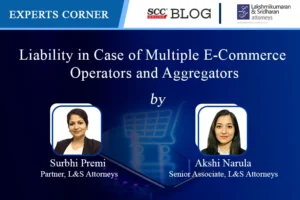Pursuant to the 50th GST Council meeting, various clarifications on pertinent issues under the GST law have been issued. Amongst others, Circular No. 194/06/2023-GST dated 17-7-2023 clarifies on the liability to collect tax at source (TCS) in case multiple electronic commerce operators (ECOs) are involved in one transaction.
The clarifications are as follows:
- Where supplier-side ECO himself is not the supplier in the said supply: It has been clarified that in such case, the compliances under Section 52 are to be undertaken by the supplier-side ECO who finally releases the payment to the supplier for a particular supply made by the said supplier through him.
-
Where supplier-side ECO is himself the supplier in the said supply: In such case, TCS is to be collected by the buyer-side ECO while making payment to the supplier for the particular supply made through it.
The circular is in line with the intent of the TCS provisions which were put in place to “create an audit trail for a supplier who made supplies through the electronic platform of others” and hence, inflicting liability to collect tax at source on one of the multiple ECOs involved in a single transaction would fulfil the same. The circular is expected to end the confusion around the subject-matter. A similar clarification1 was also provided with respect to booking of hotel where multiple ECOs are involved.
Supplies made “through” ECO
However, with penal provisions in place which get triggered on non-collection of tax at source, the circular falls short of providing clarification with respect to meaning of the phrase supplies made “through” ECO and proceeded on the assumption that supplies are made through both ECOs. There may be multiple factors which may determine whether the supplies are being made “through” the said ECO.
In a ruling rendered on the applicability of Section 9(5) of the Central Goods and Services Tax (CGST) Act,2 the authority while examining whether the supplies are being made “through” the applicant ECO, ruled that the applicant merely connects the driver and passenger and their role ends on such connection, they have no control over actual provision of service-by-service provider, do not have details of ride and they merely identify the supplier and do not take responsibility for completion of this ride. In the said case, the applicant only provided technology to cab operators through app and it allowed the passenger to identify the nearby cab operators, ride was also not monitored by the applicant, fare and method of its collection were not known to the applicant and the consideration was also not collected by the applicant. The authority ruled that instant supply was not made “through” the applicant and therefore, applicant was not liable to pay GST. The authority noted that the word “through” in the phrase services supplied thought e-commerce operator gives the meaning that the services are to be supplied by means of/by agency of/from beginning to end/during entire period by e-commerce operator.
Although, the case was not rendered in the context of Section 52, the same can be of relevance in determining the supplies made through the ECO in such circumstances also. Though the emphasis that needs to be supplied to the term “through” in the context of Sections 9(5) and Section 52 poses a question because Section 9(5) is a deeming fiction wherein the ECO has been deemed to be the supplier liable for paying the tax.
Further, there could be two possible models of multiple ECOs operating in a single transaction — one is where the buyer-side ECO platform is integrated with supplier-side ECO and other is where the buyer-side ECO redirects to the supplier-side ECO, however, the circular is silent on this while clarifying the issue.
ECOs paying tax under Section 9(5)
The Government has specified certain categories of services such as transportation of passengers, services by specified hotels and restaurants, the tax on which shall be paid by the ECO if such services are supplied through it.
Similar to the issues discussed in the context of Section 52, there are cases where multiple ECOs are involved in a single transaction and are engaged in supplying the categories of services on which GST is payable under Section 9(5). Therefore, the question that arises is which ECO is required to make payment under Section 9(5). However, the same has not been clarified yet.
Further, a question may arise in a single transaction involving multiple ECOs wherein the supplier-side ECO is making Section 9(5) compliance whether the buyer-side ECO may still be made liable for TCS compliance while making payment to supplier-side ECO since ECO under Section 9(5) has been treated akin a supplier of goods or services liable for making payment of tax.
Conclusion
The recent circular indeed provided clarity on a very pertinent issue being faced by the industry in the context of Section 52. However, clarification with respect to its applicability in the context of Section 9(5) is still awaited. Furthermore, the phrase supplies made “through” the e-commerce operator is required to be clarified by the Board at the earliest to avoid any unnecessary disputes in future.
† Partner, Lakshmikumaran and Sridharan Attorneys.
†† Senior Associate, Lakshmikumaran and Sridharan Attorneys.
1. Frequently Asked Questions on TCS under GST, Law Committee GST Council dated 28-9-2018.
2. Multi-Verse Technologies (P) Ltd., In re, 2022 SCC OnLine Kar AAR-GST 24.

